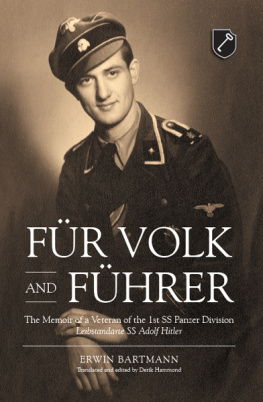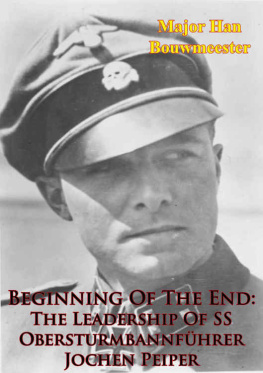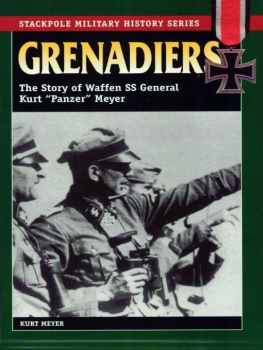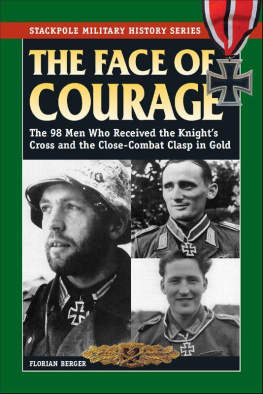
Originally published in German in 2010 as
Mit Goldener Nahkampfspange
Werner Kindler Ein Panzergrenadier der Leibstandarte.
This English edition first published in 2014 by Frontline Books

an imprint of Pen & Sword Books Ltd,
47 Church Street, Barnsley, S. Yorkshire, S70 2AS
www.frontline-books.com
Copyright Munin Verlag
Deutsche Buchunion GmbH
Translation copyright Frontline Books, 2014
Foreword copyright Frontline Books, 2014
HARDBACK ISBN: 978-1-84832-734-4
PDF ISBN: 978-1-47383-667-9
EPUB ISBN: 978-1-47383-491-0
PRC ISBN: 978-1-47383-579-5
All rights reserved. No part of this publication may be reproduced,
stored in or introduced into a retrieval system, or transmitted,
in any form, or by any means (electronic, mechanical, photocopying,
recording or otherwise) without the prior written permission
of the publisher. Any person who does any unauthorized
act in relation to this publication may be liable to criminal
prosecution and civil claims for damages.
CIP data records for this title are available from the British Library
For more information on our books, please visit
or write to us at the above address.
Printed and bound by CPI Group (UK) Ltd, Croydon, CR0 4YY
Typeset and designed by M.A.T.S. Leigh-on-Sea, Essex
Contents
by Charles Messenger
List of Plates
Foreword
T here is no doubt that Werner Kindler was a very brave soldier and was probably very lucky to survive the war. He was also clearly a dedicated member of the Waffen-SS and appears to have retained his Nazi views throughout his life. True, Kindler had cause to be hostile towards the Poles. His family lived in the so-called Polish Corridor, which Germany had had to surrender to newly independent Poland after the First World War, and, as ethnic Germans, suffered. He therefore welcomed the German invasion of Poland. He then found himself in the SS Totenkopf, with whom he did his military training before joining the Leibstandarte, which had originally been formed as Hitlers personal guard. He entered Russia with it at the beginning of July 1941 and remained with the division until the very end of the war. Three spells on the Eastern Front, northern Italy over the time of the Italian surrender to the Allies, Normandy, the Ardennes counteroffensive, Hungary, and finally Austria provided the author with a wealth of combat experience.
Kindler claims that Hitler launched a preventive war against the USSR because it was poised to strike at Germany and cites an article in Pravda of June 2001 and a book by Viktor Suvorov, nom de plume of Vladimir Rezun, a Soviet army officer who defected to the West in 1978. Rezun wrote a number of books claiming that Stalin intended to attack and was supported by a number of German and Russian historians. It was, however, a total myth in that, largely as a result of Stalins purges, the Soviet Armed Forces were in no fit state to launch any form of attack and were still undergoing drastic reforms resulting from their poor showing against the Finns during the winter of 193940. Their posture in June 1941 was solely defensive.
When we get on to the actual fighting and what it was like, Kindler says little about his own feelings and experiences. The only aspect that he does recount in detail is the medals and other awards that he earned. In particular, he details every day that counted towards his Close-combat Badge. It is difficult not to believe that he was what the British called in the Second World War a gong hunter, although he does also recount the awards won by his comrades. Otherwise, the book is more a history of his battalion, 3rd Battalion, 2nd SS-Panzer Grenadier Regiment, which he calls the APC Battalion. His ultimate hero is its commanding officer, Jochen Peiper, who time and again displayed extraordinary leadership and tactical flair, qualities which he would take with him when he was promoted to command 1st SS-Panzer Regiment, also in the Leibstandarte and under which Kindlers battalion often fought.
What is revealing is the authors views on general aspects of the war. The Russians are guilty of atrocities against German soldiers, but there is no mention of those perpetrated by the Waffen-SS and the German Army. He has little regard for Germanys enemies, except perhaps the Western Allies air power, but Allied bomber crews are dubbed terrorists. Unconditional Surrender meant the adoption of the Morgenthau Plan, which aimed to strip Germany of all its industry. This, indeed, was Allied policy until more realistic measures were adopted at the July 1945 Potsdam Conference and the German propaganda machine made much of it during the last months of the war. Kindler, however, goes one further, claiming that the intention was also to literally emasculate the German male population. When it comes to the December 1944 Ardennes counter-offensive and, in particular, the Malmdy Massacre, he claims that Peiper and his men were forced to make false confessions. As for himself, he was not at the scene since his sub-unit was providing security for the battle groups supply echelon. As to who did carry out the murder of the US soldiers, Kindler offers no explanation. Finally, he noted that morale plummeted when Hitlers death was announced.
What then to make of this book? Some will view Kindler as an arrogant and cold-blooded warrior, who delighted in combat. Others may consider him as a man displaying intense loyalty to his country. What his writing does reveal, however, is something of the mind-set of the Waffen-SS soldier, whose fighting spirit was largely forged from the very close bonds which existed among his officers and their men, bonds much closer than those in the Army. Add in National Socialist indoctrination and one begins to understand what motivated them to continue to fight with the same intensity long after the prospect of ultimate victory had vanished.
Charles Messenger
Preface and Translators Notes
T he author Werner Kindler was a Volksdeutscher, a person of German race and blood who by political circumstances had a bond, whether desired or otherwise, to the foreign country in which he was born and dwelt. In 1920, West Prussia became Polish territory by virtue of the Treaty of Versailles, and Werner Kindler was born there in 1922. It was Hitlers avowed intent that all these expatriate Germans, and the former German territories of which Germany had been dispossessed after the First World War, should return to the Reich. Although West Prussia was reincorporated into the German Reich in 1939 by conquest, the author was technically ineligible for the Wehrmacht, and so was conscripted into the Waffen-SS.
His memoir is the story of the ensuing six years of his life during which time he became one of the most highly decorated noncommissioned soldiers to serve in the German armed forces. He first saw frontline action in Russia in 1941 as a machine gunner, and was then selected for 1st SS-Panzer Division Leibstandarte Adolf Hitler (LAH). He remained in it until the end of the war.
Eighteen million men served in the German armed forces in the Second World War, and only 630 of them were awarded the Close-combat Clasp in Gold. The author was one of them. This statistic bears witness to the high value of this decoration, for which the soldier was required to have confirmed in his service record book (Soldbuch) fifty close-combat days. Accordingly this decoration could only be won after years of bitter fighting and privation. By October 1944, when the recording of his close-combat days was discontinued, the author had already amassed eighty-four confirmed days. He eventually received the award on 1 April 1945.
Next page








